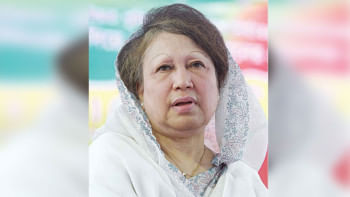A heart of gold

Dr N A M Momenuzzaman, eminent cardiologist at United Hospital, might appear to be very austere and serious, but when you sit to chat with him, you will be proved wrong. The busy physician loves to play the flute, enjoys farming, and takes pleasure in holidaying with friends.
"I am just a boy from the village who had no pad to get launched in the city, yet I rose to this height with sheer dedication and willpower, and the love of my patients. I believe that's a great achievement," said the doctor, who proudly maintains all his work records from his first surgery till date.

His ambition, as in what will be his future career, was set by-default by parents. He grew up in a middle-class family environment, and in those days, things like future career were governed by the family head. They were seven siblings, and his father was a college head clerk, with big dreams for his children. He made sure that all of them were well-educated, and as his elder brother went to BUET, his father chose his career in medicine.
Dr Momenuzzaman came to Dhaka and sat for the written medical admission test at Mitford, quietly returned to his village in Rajbari, and took admission for a BSC degree at a local college. It was while doing his pass course classes that the principal pointed out that he got admitted in a medical college.

"Cardiology was also not my target base and once again, I stumbled upon it, not by choice. In 1982, after completing my degree, I was transferred to a remote village in Shariatpur; my first posting. The village didn't have any paved roads, only one herring bone track laid out by bricks. I spent my mandatory two years in the village and when I came to Dhaka, I stayed in the PG hospital hostel, purely for its academic environment and to keep myself surrounded by scholars. I opted for admission tests in many places for the post of Assistant Registrar and during that time, I sat in classes and listened to lectures without being a registered student. I wanted to study clinical surgery; however, I got a chance as assistant registrar in Rangpur. After starting there, one of my professors gave me a cardiology booklet. After I read it, I went to Nilkhet and found myself a big fat book on the heart, and that got me into cardiology. Also, my father advised not to go for diplomas but to get real degrees. And that's how my cardiology story began," he explained.
During his free time, he loves to go to the village home and stay close to nature.
"I have many social activity projects like my farm house with ventures on farming, seed banks, vermicompost, and fishery. These projects I took up to teach people the basics of farming and as a result help the ultra-poor of the village.
"I also run an IT centre for adolescent children with the help of my younger brother living in Canada. I give training in technology in advance. When these kids grow up and enter the job market, then we will see the true results. I spend five days at work and my weekends are for my projects. I get immense pleasure from these. Moreover, I spend time with my parents," he said.

Every year after qurbani Eid, during the full moons, his friends from medical college group plan trips to go to different places like Monpura, chars, Ratargul.
"These are our full moon holiday with friends. I love these tours. For me, friends and family are very important. I sometimes feel that with the nuclear family system nowadays, the next generation is not learning about sharing and bonds. I believe sharing familial love and tragedies are more important than giving them financial support," he said.
Adding that the ongoing pandemic will not disappear, "It is here to stay and we have to adapt to the norms and restart our everyday lives, we have to change ourselves; it's like dengue, when it first spread, we were ill-equipped and many fell victim. But now, we know how to treat it, thus there is hardly any casualty. This pandemic too shall be normalised like that once we change our ways."
Ending on a happy note, he said that one good thing that has happened health wise is that people are wearing masks, and that will prevent and lessen respiratory infections in the country overall.

Photo: Sazzad Ibne Sayed and Personal Collection


 For all latest news, follow The Daily Star's Google News channel.
For all latest news, follow The Daily Star's Google News channel. 



Comments